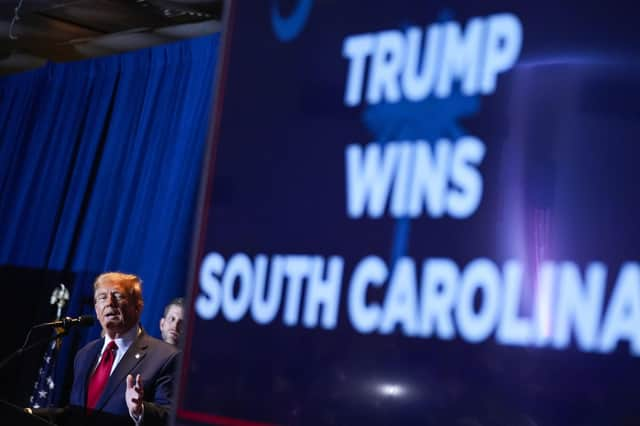Ian Ellis: Pro Trump evangelicals overlook his flaws because they believe he will deliver their vision for America


Paradoxically, the former president's popularity seems to have been boosted rather than hindered by the numerous and serious court cases he has been facing.
They are being put down by him and his supporters to political interference in his campaign by the US Department of Justice. It is an unconvincing conspiracy theory that no doubt is found offensive within judicial and administrative ranks.
Advertisement
Hide AdAdvertisement
Hide AdOne of the aspects of the situation that may understandably cause some puzzlement is just how Mr Trump, given all the adverse news about him, retains such strong support among evangelical Christians.
David Smyth, head of Evangelical Alliance Northern Ireland, told me for this column that while many evangelicals in America are distancing themselves from Donald Trump, he finds it “concerning and regrettable” to see others continue to champion someone “who has surely proved himself to be ethically unfit for such public office”.
It seems that Trump-devoted evangelicals feel they can overlook his personal flaws because they believe he will deliver their vision of America.
An interesting discussion of this topic of Trump and evangelicalism was aired recently on MSNBC's 'Tonight' programme, presented by Alex Wagner.
Advertisement
Hide AdAdvertisement
Hide AdMs Wagner asked guest Tim Alberta, staff writer at The Altantic and author of 'The Kingdom, the Power and the Glory – American evangelicals in an age of extremism', precisely what it means to be an evangelical nowadays in the US.
Replying, Alberta recounted how, anecdotally, when the late and legendary evangelical Billy Graham was asked what it meant to be an evangelical he responded by saying that he would like to know the answer to that question himself.
I would not be surprised by such a reaction because the word 'evangelical' is understood in different ways around the world, and Billy Graham was indeed a global evangelist.
David Smyth also told me that he feels it is unfortunate that in America evangelicalism has been “conflated” with Trumpism. He pointed to how scholars David Bebbington and Alister McGrath have identified five key characteristics of an evangelical, in recognising:
Advertisement
Hide AdAdvertisement
Hide Ad• The centrality of the Bible, although not implying thoroughgoing literalism;
• The centrality of Christ, the incarnate “eternal Word” who definitively reveals God to humanity;
• The centrality of the cross, as the place where atonement was made for all people;
• The importance of conversion, involving personal repentance and a discernible reorientation of the individual's life towards God; and
Advertisement
Hide AdAdvertisement
Hide Ad• The importance of activism, involving evangelism and social action.
In those terms, it is clearly not a particularly narrow outlook, albeit one with clear parameters. Then again, there is a denomination called the Evangelical Lutheran Church in America which is not at all hard-line.
In Germany, the main protestant church is known as the Evangelische Kirche. However, the German word 'evangelisch' is in fact perhaps best translated as 'protestant'. German has a separate word for 'evangelical' in the sense it is normally used in English. It is the word 'evangelikal'.
What distinguishes the English-language terms 'evangelical' and 'protestant'? It has a lot to do with theological emphasis. Evangelicals are typically theologically conservative while protestantism also includes believers who have a more liberal and less fixed outlook. In fact, the word 'evangelical' derives from the Greek word 'euangelion', which means 'good news' or 'Gospel', so it can be applied, albeit with differing nuances, within any Christian tradition.
Advertisement
Hide AdAdvertisement
Hide AdIn her programme, Alex Wagner quoted an entrance poll conducted by NBC at the Iowa Republican caucuses in January. It was quite revealing.
According to the poll, 55% of respondents identified as white evangelicals, with 53% of them voting for Trump. In 2016, the figures were 62% identifying as white evangelicals but only 21% voting for Trump.
In the recent South Carolina primary, ABC News reported that 60% of Republican voters identified themselves as evangelical white Christians, with Politico quoting a Monmouth poll indicating that 69% of South Carolina's white evangelicals back Donald Trump.
In his interview with Wagner, Tim Alberta commented that in America there is now “a blurring of the line between religious and political identity”. This has led to the rise of the Christian nationalism phenomenon.
Advertisement
Hide AdAdvertisement
Hide AdWriting in a recent New York Times article, journalists Ruth Graham and Charles Homans observed that while white evangelicals have long supported Republican candidates, “no Republican has had a closer, or more counter-intuitive, relationship with evangelicals than Mr Trump”.
They also reported that in 2020, the former president announced that he no longer identified as a Presbyterian but as a “non-denominational Christian”, and that despite the fact that he is rarely seen in church, a recent poll had found that more than half of Republicans see him as a “person of faith”.
That suggests a decoupling of at least this kind of American evangelicalism from both denominationalism and even churchgoing. Indeed, Trumpism, combining “America first” politics, revival-style rallies and this new variant of evangelicalism, has become a kind of quasi-religious cult.
One only has to look at the brazen 'God made Trump' video in which the former president is depicted as a divinely sent “shepherd to mankind”.
Advertisement
Hide AdAdvertisement
Hide AdEvangelical Trumpism is a movement that in fact has moved beyond the bounds of evangelicalism as we and others around the world, including in America, have known it.
• Canon Ian Ellis is a former editor of The Church of Ireland Gazette